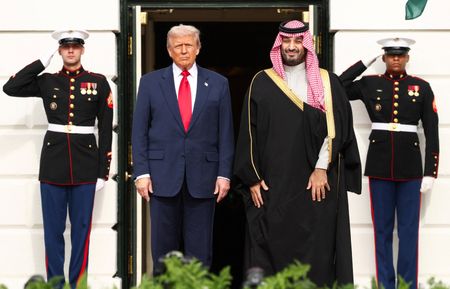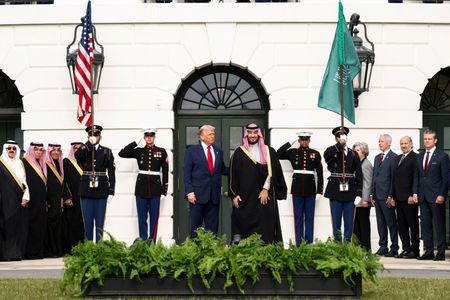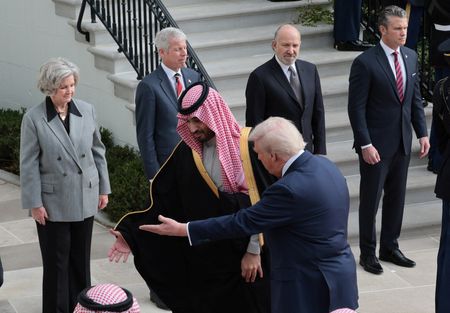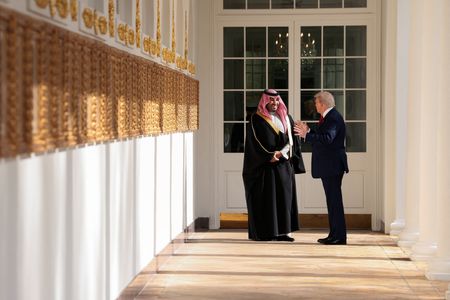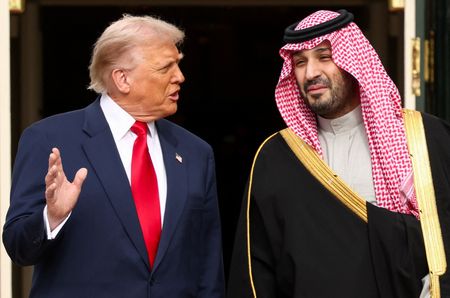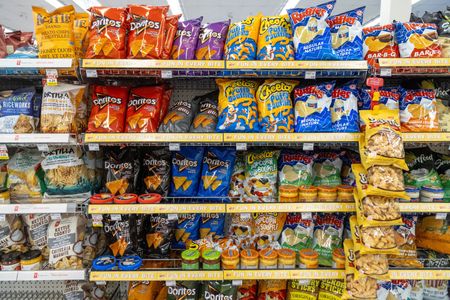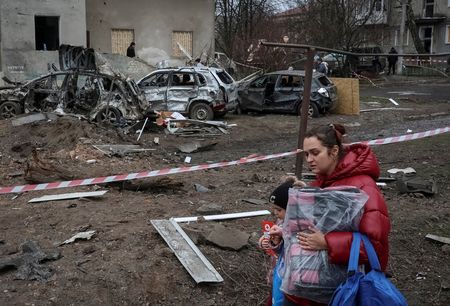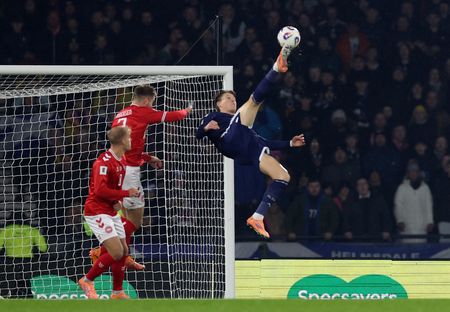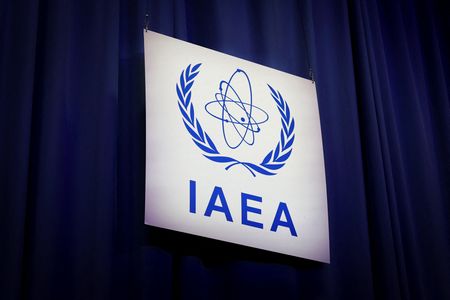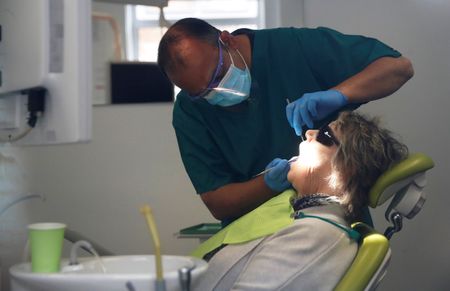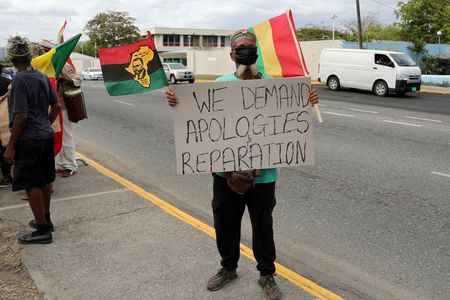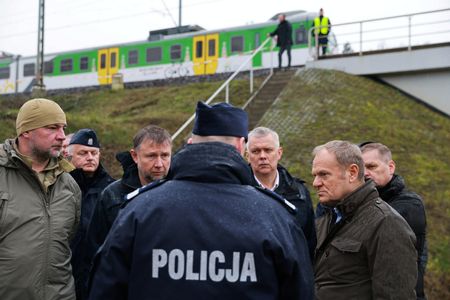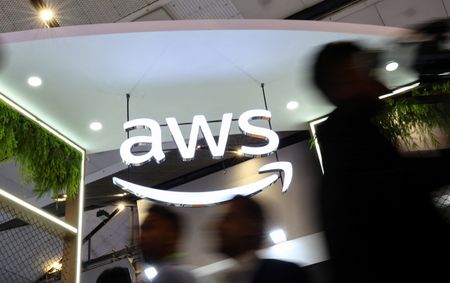By Steve Holland, Matt Spetalnick and Humeyra Pamuk
WASHINGTON (Reuters) -U.S. President Donald Trump insisted on Tuesday that Mohammed bin Salman knew nothing about the 2018 killing of journalist Jamal Khashoggi by Saudi agents, offering a fierce defense of the visiting Saudi crown prince that contradicted a U.S. intelligence assessment.
The controversy over the killing of Khashoggi, a Washington Post columnist and U.S.-based critic of the Saudi leadership, flared again in the Oval Office in front of cameras as the kingdom’s de facto ruler made his first White House visit in more than seven years seeking to further rehabilitate his global image tarnished by the incident.
U.S. intelligence agencies concluded that bin Salman approved the capture or killing of Khashoggi at the Saudi consulate in Istanbul. The crown prince denied ordering the operation but acknowledged responsibility as the kingdom’s de facto ruler.
“A lot of people didn’t like that gentleman that you’re talking about, whether you like him or didn’t like him,” Trump told reporters in the Oval Office with bin Salman sitting beside him. “Things happened, but he knew nothing about it, and we can leave it at that.”
Bin Salman said it had been “painful” to hear about Khashoggi’s death but that his government “did all the right steps of investigation.” “We’ve improved our system to be sure that nothing happened like that. And it’s painful and it’s a huge mistake,” he told reporters.
Trump, who chided the reporter who asked the Khashoggi question “to embarrass our guest,” also praised the crown prince for doing an “incredible” job on human rights but did not elaborate.
Trump’s treatment of bin Salman prompted a rebuke from Khashoggi’s widow. “There is no justification to murder my husband. While Jamal was a good transparent and brave man many people may not have agreed with his opinions and desire for freedom of the press,” Hanan Elatr Khashoggi wrote on X, urging bin Salman to meet with her.
Bin Salman has been strongly criticized by human rights groups not only for the Khashoggi killing but for his crackdown on dissent at home. But the crown prince has also unleashed major social reforms that have swept away some austere social codes.
At the start of his visit, the crown prince was greeted with a lavish display of pomp and ceremony presided over by Trump on the South Lawn, complete with a military honor guard, a cannon salute and a flyover by U.S. warplanes.
WARM WELCOME FOR SAUDI PRINCE
The meeting underscores a key relationship — between the world’s biggest economy and the top oil exporter — that Trump has made a high priority in his second term as the international uproar around the killing of Khashoggi, a Saudi insider-turned-critic, has gradually faded.
The warm welcome for bin Salman in Washington marks a high point for the U.S.-Saudi ties, which have suffered because of Khashoggi’s murder. Trump’s predecessor Joe Biden traveled to the kingdom and met with the Saudi prince but he stopped short of hosting him at the White House.
Sitting next to Trump, bin Salman promised to increase his country’s U.S. investment to $1 trillion from a $600 billion pledge he made when Trump visited Saudi Arabia in May. But he offered no details or timetable.
A $1 trillion investment in the U.S. would be difficult for Saudi Arabia to pull together given its heavy spending on an already-ambitious series of massive projects at home, including futuristic megacities that have gone over budget and faced delays and stadiums for the 2034 World Cup.
Spearheading an ambitious Vision 2030 plan to diversify the Saudi economy and lessen its dependence on oil, bin Salman is expected to tout his efforts at an investment conference to be attended by a slew of corporate executives on Wednesday at the John F. Kennedy Center for the Performing Arts.
Trump said he got a “positive response” about the prospects for Saudi Arabia normalizing ties with Israel. But the crown prince made clear that while he wanted to join the Abraham Accords, he was sticking to his condition that Israel must provide a path to Palestinian statehood, which it has refused to do.
Trump told reporters that the two countries had reached a “defense agreement,” without providing details, and that Saudi Arabia would buy advanced U.S.-made F-35 fighter jets.
Most experts expect Trump to issue an executive order creating the kind of defense pact he recently gave to Qatar but still short of the congressionally ratified NATO-style treaty the Saudis initially sought.
The sale of the stealth fighter jets to the kingdom, which has requested to buy 48 of the advanced aircraft, would mark the first U.S. sale of the advanced fighter jets to Riyadh, a significant policy shift. The deal could alter the military balance in the Middle East and test Washington’s definition of maintaining what the U.S. has termed Israel’s “qualitative military edge.” Until now, Israel has been the only country in the Middle East to have the F-35.
FAMILY BUSINESS
In the Oval Office, Trump vehemently denied any conflict of interest with his family’s Saudi investment interests.
“I have nothing to do with the family business. I have left, and I’ve devoted 100% of my energy. What my family does is fine. They do business all over,” he said.
The White House has repeatedly said that upon taking office, Trump ended his involvement in his businesses after placing them in a trust managed by his children. Still, as beneficiary of the trust that controls the Trump Organization, the president will have the money the family is now making at his disposal when he leaves office.
Earlier, Trump greeted bin Salman with a smile and a handshake on the red carpet, while dozens of military personnel lined the perimeter. The limousine was escorted up the South Drive by a U.S. Army mounted honor guard. The two leaders then looked skyward as fighter jets roared overhead.
Bin Salman and his delegation had lunch with Trump and his aides in the Cabinet Room and was due to attend a formal black-tie dinner at the White House, giving him many of the trappings of a state visit.
Trump also said he could see a possible civilian nuclear deal happening with Saudi Arabia. Bin Salman has been seeking such an agreement to unlock access to U.S. nuclear technology and help Saudi Arabia level up with the UAE and traditional regional foe Iran.
But progress on a nuclear pact has been difficult because the Saudis have resisted a U.S. stipulation that would rule out enriching uranium or reprocessing spent fuel – both potential paths to a bomb.
(Reporting By Steve Holland, Matt Spetalnick and Humeyra Pamuk; Editing by Don Durfee, Cynthia Osterman and Alistair Bell)

